25 Cognitive Activities for Toddlers to Boost Development
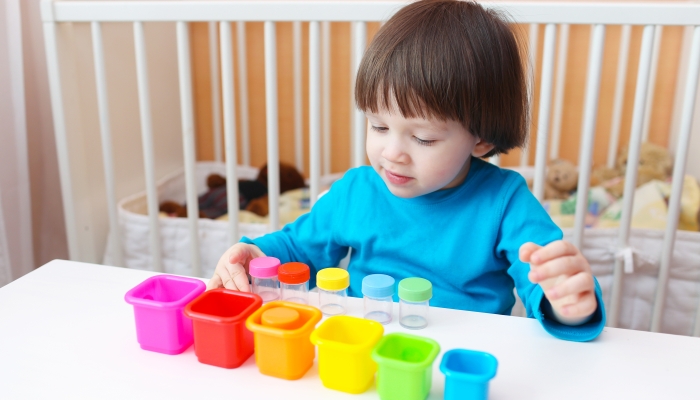
- Your child’s brain grows the most during toddlerhood than during any other time of their lives.
- There are many factors that affect cognitive development—genes, relationships with caregivers, screen time, nutrition, sleep, learning disabilities, physical activity and environment.
- There are certain cognitive milestones your toddler should reach by the time they are three years old.
- There are many fun cognitive activities to help your child reach their milestones.
Do you feel like crying when your toddler asks you to sing the same song you’ve been singing for the past hour? Do you want to hide the book you’ve read three times a day for the past month?
I have good news for you! Every time you sing or read to your child, you’re boosting their cognitive development! This may be of little comfort to you when you’re on your tenth rendition of “Itsy Bitsy Spider,” but once you learn how important toddler cognitive skills are, you’ll muster up the strength to sing until your voice is hoarse.
If you need a break from singing, there are tons of cognitive activities for toddlers that you can do to boost their development!
All About Your Toddler’s Cognitive Development
Cognitive development refers to how children think, develop fluid reasoning, explore, gain knowledge and problem solving skills, and learn more about the world around them.
As toddlers develop cognitive skills, their memory, attention, adaptability, understanding of cause and effect, language skills, intelligence, and critical thinking improve.
Toddler cognitive development is hugely important in laying the groundwork for these skills. It was highlighted in a 2021 article published by the University of Minnesota that by three years of age, a child’s brain is already 80% developed!
While your child is still in their toddler years, you have the perfect window to develop their cognitive skills. Since most brain growth and connections happen in the first three years of a child’s life, it is more difficult for children to develop their cognitive skills later in life. Even early literacy skills can be gained through cognitive activities for toddlers.
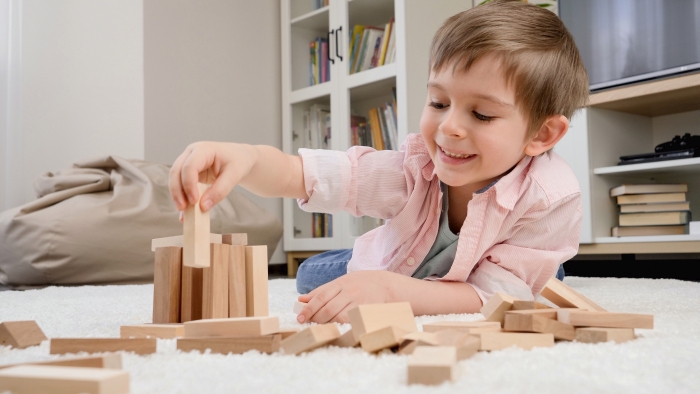
Factors That Can Affect Cognitive Development During Toddlerhood
You’ve probably heard the term “nature vs. nurture.” Nature refers to the genes our children inherit from us, and nurture refers to our children’s experiences, interactions with others, and general upbringing.
When it comes to cognitive development in toddlers, both nature and nurture affect their cognitive abilities.
Our genes are out of our control, but they are only one piece of the puzzle. There are many other factors within our control that promote cognitive development during toddlerhood, including:
- Warm, affectionate, positive interactions with dependable caregivers
- Limited screen time with exposure to cognitive toys
- Early intervention for children with learning disabilities
- Good nutrition with balanced meals and vitamin supplements if necessary to aid in brain development
- Quality sleep to help the brain remember information
- Physical activity, especially outdoors, improves cognitive skills
- Limited exposure to chronic, toxic stress (neglect, abuse, certain types of punishment and unreliable caregivers)
- A physically safe environment with head protection to prevent brain injuries during falls
- Limited or no exposure to toxins such as lead
- Vaccinations to protect against infections, including those that prevent brain swelling
What Are the Cognitive Developmental Milestones for Toddlers?
Every child develops at their own rate, but these are some of the cognitive developmental milestones you can expect in early childhood:
From 1 to 2 Years
- Tries to imitate adults
- Points out familiar objects in picture books
- Understands the difference between “me” and “you”
- Knows what everyday items are used for
- Points to items to get attention
- Pretend plays with dolls or stuffed animals (i.e. pretending to feed them)
- Points to one body part
- Scribbles independently
- Follows 1-step directions
- Puts things in containers and takes them out
- Has memories of past events
- Recognizes familiar people by name
- Finds easily hidden objects
From 2 to 3 Years
- Imitates more advanced adult actions like washing dishes or doing laundry
- Names objects, colors, animals, and letters in picture books and everyday life
- Sorts objects by category
- Stacks rings on a peg in size order
- Understands their own reflection in a mirror
- Finds things even when hidden under two or three covers
- Completes sentences or rhymes in familiar stories
- Plays make-believe games (pretend play)
- Builds towers of at least four blocks
- Follows two-step directions (e.g. “Pick up your toy and put it in the bin.”)
- Finishes puzzles with 3-4 pieces
- Draws a circle after watching an adult draw it
3 Years Old
- Helps get themselves dressed
- Knows their name, age, and gender
- Follows step-by-step directions
- Uses buttons, levers and moving parts on toys
- Does imaginative play (e.g. pretends they are a dog or makes up stories for their dolls)
- Builds towers of more than six blocks
- Screws and unscrews lids or turns door handles
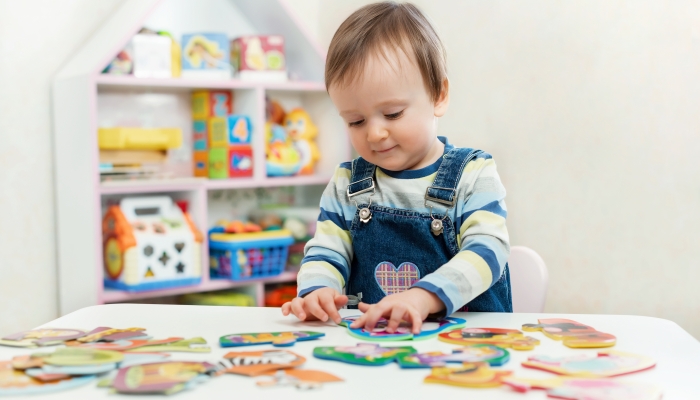
What Can You Do to Boost Your Toddler’s Cognitive Development?
Play is key! Toddlers learn the most from playing, and your job is to support that play. This means exploring with your child, playing with them when appropriate and giving them space for independent play when needed.
As your child is playing, describe new objects they encounter and ask questions about what they’re doing. When it comes to play, your toddler is the leader, and you’re there to make sure they’re getting the most out of it.
During play, refrain yourself from helping your toddler too much. Instead, give them tips for what they might try when they get frustrated.
There are many different types of play you can organize for your toddler—free play, pretend play, outdoor play, play with cognitive activities and toys (cause-and-effect toys, matching games, sorting games, categorizing games, puzzles), and social play with other children. Each type of play is beneficial to toddler cognitive development and should be encouraged.
Also, spend some time focusing on vocabulary and language skills. Use a variety of words when interacting with your toddler. Sing songs and nursery rhymes together and read to them often. Most importantly, show patience and warmth when responding to your toddler.
If you’re concerned with your toddler’s cognitive development, talk to a doctor or therapist to see if early intervention is needed.
25 Fun Cognitive Activities for Toddlers
Providing quality cognitive activities for toddlers may have you feeling overwhelmed. We’ve got you covered with fun cognitive development activities that will boost your toddler’s development and keep you both smiling along the way!
- Provide wooden blocks for stacking and building.
- Go on a scavenger hunt looking for specific things (things that start with a certain letter or are a certain color).
- Provide a bucket of soapy water and sponges outside to wash toys with.
- Go on a treasure hunt outside (collect acorns, rocks, leaves, etc.) and have them make art with their treasures.
- Play games to practice following directions like “Follow the Leader” or “Simon Says.”
- Throw rocks into a body of water and predict how big the splashes will be.
- Let them pretend play with kitchen utensils.
- Write letters on post-its and have your toddler stick them to objects whose names begin with each letter.
- Make animals out of playdough with your child.
- Let them match their socks or sort their toys by color.
- Go outside and try to figure out which direction the wind is coming from.
- Gather items and have your toddler sort them based on color, category, shape, etc.
- Provide matching games and puzzles.
- Draw a simple picture and then cut it into a few pieces. Have your toddler put the pieces back together.
- Practice counting throughout the day—how many stairs they go up or down, how many times they go down the slide at the park, how many cheerios they eat, etc.
- Cook with your child to teach them how to follow directions, measure, and learn numbers.
- Cut post-its into shapes and have your child stick them to objects they find that match each shape.
- Go outside during each season and make notes of what you hear, see, feel, and smell.
- Create an art box with scrap paper, crayons, markers, and other materials and let them have free time to create.
- Sing songs and come up with actions to do during each song that your toddler can imitate.
- Take your toddler to a local children’s museum, a local farm, library, or even the grocery store to provide for exploration. Ask questions while you both explore.
- Have other children come over for playdates to help with social skills.
- Look in the mirror with your child and have them make faces to show different emotions. Playing with mirrors helps children develop their self-image and learn nonverbal cues.
- Bury treasures (small toys, rocks, acorns, etc.) in sand or wood chips outside and have your child find them.
- Add fun containers to the bath for pouring, measuring, and experimenting with which items float and which items sink.
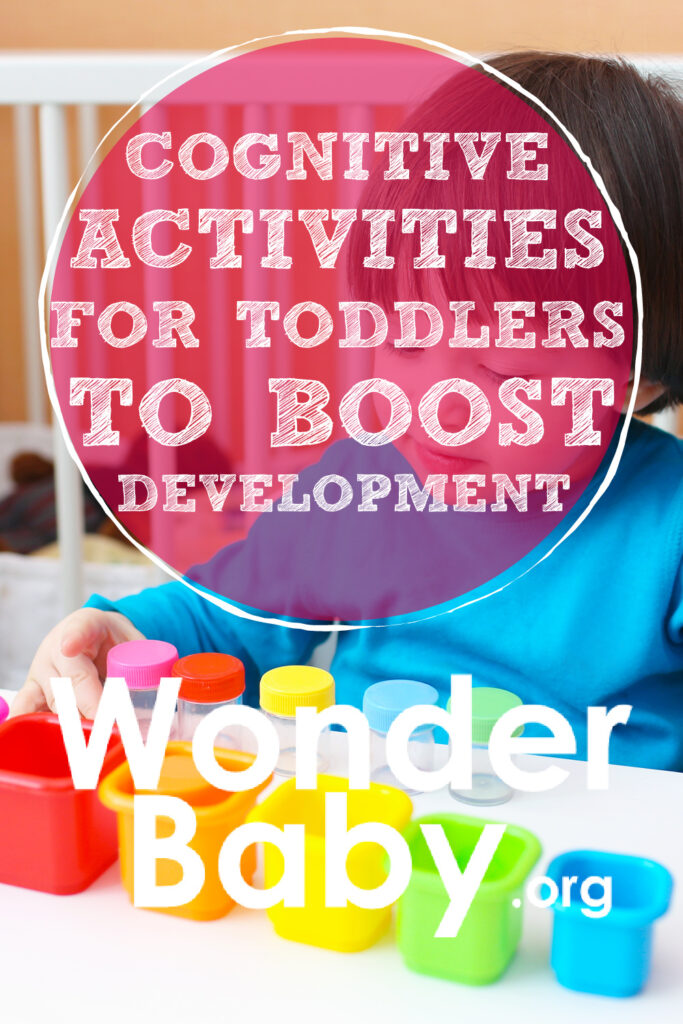
Related Posts
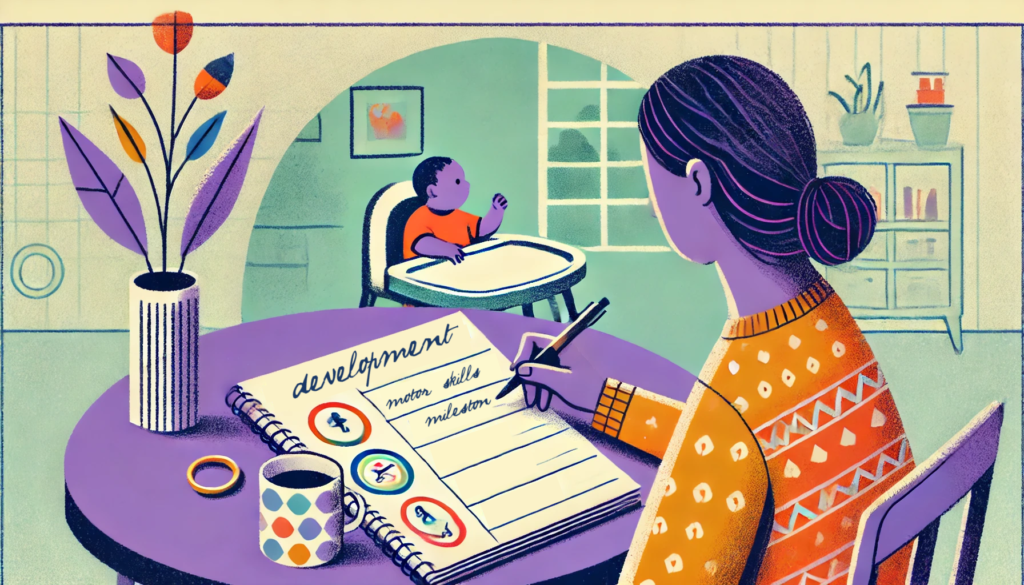
Development, Special Needs
How to Track Milestones for Developmentally Delayed Babies
Parents of developmentally delayed babies can explore practical tools and strategies to track milestones, celebrate progress, and support their child’s unique developmental journey.

Fine and Gross Motor
5 Alternatives to Tummy Time for Babies with Motor Development Challenges
Does your baby struggle with tummy time due to motor development challenges? These alternatives to tummy time will offer the same benefits.
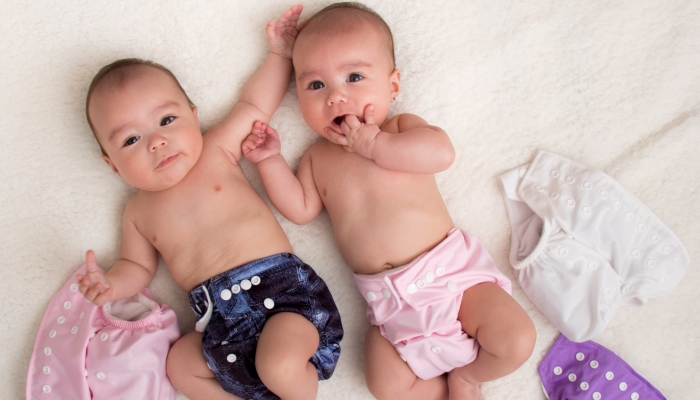
Development
Should Twins Share a Room?
Wondering if your twins should share a room? We’ll explore the pros and cons of room-sharing for twins right here before you make your decision.